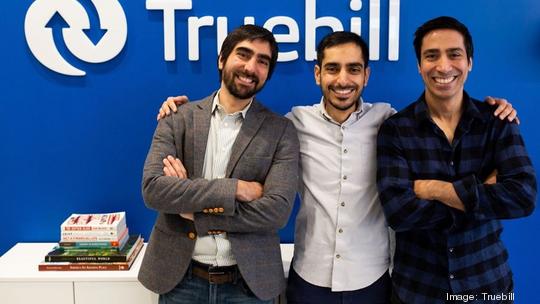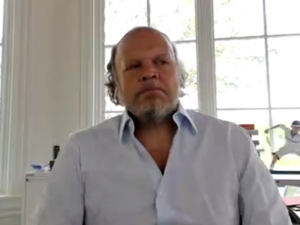
Silver Spring financial startup Truebill says it has raised $17 million in new funding — not to mention saved its customers more than $100 million — as it works to expand its customer base and its array of financial health tools.
The funding round would bring the startup’s total funding raised to $40 million, according to the company. The round was led by Bessemer Venture Partners, along with existing investors Eldridge Industries, Cota Capital, Firebolt Ventures and Day One Ventures. It also brings the company a step closer to its stated goal "to meaningfully improve the financial health of millions of people."
Truebill, founded in 2015 by brothers by Haroon, Yahya and Idris Mokhtarzada, was originally created to simplify tracking and managing subscriptions and bills. But over time it has grown to negotiating bills as well, allowing customers to benefit from lower payments or one-time credits. There is a free version of the app, as well as a premium version in which customers pay a monthly amount they feel is right, as opposed to a set price, although most people pay between $3 and $12, Truebill chief revenue officer Yahya Mokhtarzada said in an interview.
Haroon Mokhtarzada serves as the CEO of Truebill, while Idris Mokhtarzada serves as the chief technology officer. The company was first launched in Silver Spring before moving to Silicon Valley, only to move back again in 2019. The brothers previously founded Webs.com, which was acquired for $117.5 million by what was then Vistaprint in 2011.
Latest funding to fuel new hires, new features
Yahya said the company was “at a at turning point” after growing at a breakneck speed for the last two years, moving from its original offering to a suite of services that customers can access. The company has more than 1 million users, he added, because it provides services that offer a long-term benefit and less of a focus on offering singular products, such as credit reports.
“It’s easy to give people tools like budgeting and savings and auto tracking,” Yahya said. “What we want is to cross the chasm into is really understanding people’s financial health and making Truebill into a cohesive platform that actually moves people to a place of financial health.”
That includes a variety of new services the company aims to bring to the platform in the coming months, including credit reports, statements and shared accounts as well as:
- A net worth tracker that allows users to view their debt and assets along with suggestions on how to improve their financial health;
- A savings feature to help guide customers to their savings goals and help them better understand how they can increase their savings by adjusting their spending habits — and earn rewards along the way;
- A debt-payoff solution that automates paying down debt in a way that is most optimal for the individual person.
Truebill has over the years grown to 70 employees but expects to employ between 120 and 140 people within the next year, including new hires on its data science team and operational people needed to keep the company running, Yahya said, adding it has been hiring "aggressively" in recent months.
And while it has up until now gained most of its customers through social media, the company intends to start running ads on television and experimenting with a broad array of advertising, including podcasts, paid influencers on social media and more, Yahya said. Currently, the company makes money by taking a cut of the money saved through lower bills, and through the premium offerings available through a the pay-what-you-choose monthly subscription.
“We just thought, 'pay what you think is fair.' We feel if we do right by them they will be right by us,” Yahya said.
Truebill's goal: land customers for life
But Truebill aims to buck the traditional route that many financial technology companies take, which is to round up a bunch of users quickly and offer them products and services — such as credit cards — regardless of whether it makes sense for people, in order to gain affiliate revenue from the card provider.
“If you are dependent on affiliate revenue you are not necessarily in alignment with your users,” Yahya said. "Sometimes giving people the best financial advice is not the most profitable thing you can do."
Instead, the company is working to offer features that its users will find helpful at any stage of their finances, so it becomes a trusted guide over time, rather than the provider of a one-time service.
That strategy addresses what he sees as a flaw within companies that work to build customers' credit or savings. If they are successful, users would “graduate” out of the app, he said. He likened other financial technology companies to dating services, which, if successful would see their users leave the platform and get married to people they met online.
“We didn’t want to build a tool where, if we succeeded in our mission, we were losing users. We wanted to build something that if we were successful we would be building a lifelong relationship with our users,” Yahya said. “We really believe in building a 30- to 40- to 50-year relationship with our users.”


